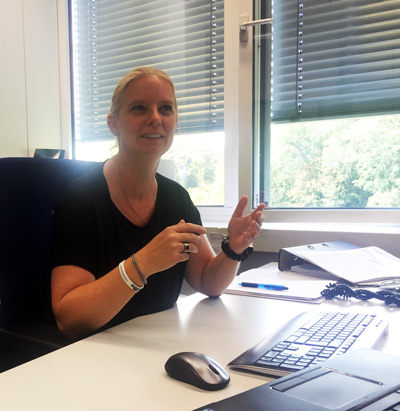A background interview on MetrioPharm’s Phase II study

Dr. Petra Schulz, Senior Manager Drug Development at MetrioPharm spoke to us about the ongoing Phase II clinical trial and the details of the current press release
Photo: © F. Edler
MetrioPharm’s lead compound MP1032 entered Phase II clinical testing in early March. How has the study gone so far?
Dr. Petra Schulz: The most important goal of a large Phase II study continues to be to test the safety of the drug, i.e. whether the patients tolerate it well. So far, nobody has had to discontinue the study after taking MP1032, which is a good signal. The other important objectives – proof of efficacy and the search for the optimal dosage – are still unknown, because at the moment the study is blinded.
This week there was a new press release: What does the inclusion of 50% of target patients mean for MetrioPharm
Dr. Petra Schulz: First of all, this means that we are well on schedule. We have already screened 120 patients, 80 of whom have been included. We are very pleased about this, because we know that other studies are also being conducted at the same time. In such a situation everyone has to win the necessary participants for his study and there is competition for the patients. But although we are a rather small company, things have gone very well for us so far. Many trial centers have even contacted us because they want to admit more patients than originally agreed on.
Do you have an explanation for this?
Dr. Petra Schulz: I think we were convincing the Investigators, the doctors who are conducting the study, with our drug. You could already see this at our big preparatory meeting in Hamburg and you can still see it today from the feedback that we have got. This good cooperation means a lot to us. In addition, we appear to be an attractive alternative for patients compared to our competitors’ substances.
What are the advantages for patients?
Dr. Petra Schulz: They can take MP1032 as a pill, so patients do not need to undergo regular injections at the trial site. And other companies work with biologics, and here we also see the skepticism of patients towards this form of therapy and its risks. We are going in a completely different direction with MP1032 and the patients seem to like it.
What is the MetrioPharm team actually doing while the study is running?
Dr. Petra Schulz: Oh, a great deal (laughs). On the one hand, we are always preparing for the next steps, the next studies and everything that goes with them. Our development is not intended to end after Phase II. In addition, we are of course monitoring the ongoing trial. We need to stay in touch with the study teams and help with any problems that may arise.
What problems have there been so far?
Dr. Petra Schulz: This summer, for example, is unusually hot and it is important that our trial medication is stored at below 25 degrees Celsius. So if the air-conditioning system in a test centre fails and the temperature continues to rise, safe storage is no longer guaranteed, so we must quickly find a solution to lower the temperatures again. This can happen more often in such a summer, but so far we have always been able to secure the drug and store it in a temperature-controlled environment.
Can this sunny summer also influence the data, i.e. the results of the study?
Dr. Petra Schulz: This summer really can. We are currently testing MP1032 in the indication psoriasis. We know that a long summer with a lot of sun has a good effect on the symptoms, in other words, sun is good for the skin and relieves the symptoms of psoriasis. This effect will probably be noticeable in our placebo group.
Does this worry you?
Dr. Petra Schulz: It is not ideal. But the weather is a factor that cannot be influenced. And there will be enough patients included in the fall. Subgroups can also be formed during the evaluation process to analyze the development of placebo patients who have not been exposed to so much sunlight.
So what will happen until the study is completed?
Dr. Petra Schulz: First of all, of course, we recruit further patients. We expect the pace to slow down a bit. During the summer months, many patients do not want to be tied to the strict schedule of a study. If everything continues to go well, the last patient should have completed his treatment by the end of the year. Then we will evaluate the data.
So the unblinding of the data?
Dr. Petra Schulz: This is the last step. Beforehand, all data collected must be re-checked. This is a very time-consuming process, in each study centre every single data point collected in the last few months is re-examined. There is a lot of work going on in the background, just so you can tick a little green box afterwards.
Is this work necessary?
Dr. Petra Schulz: Perhaps not in an ideal experimental environment, but studies are done in the real world. When transferring data, errors can happen or patients may forget to take their pills or their dog ate a whole week’s ration. The strangest things really do happen. So we have to make sure that all data that ultimately come into the evaluation are absolutely valid. This is essential for MP1032 to be approved.
And when will the results of the study be published?
Dr. Petra Schulz: You can only say for sure after the last patient has been included. So when patient number 150 has started treatment, I can calculate exactly how long it will take. But if things continue to go as well as planned, we will have top-line data in the first quarter of 2019.

Dr. Petra Schulz during our conversation in August 2018
Photo: © Eva Brysch




